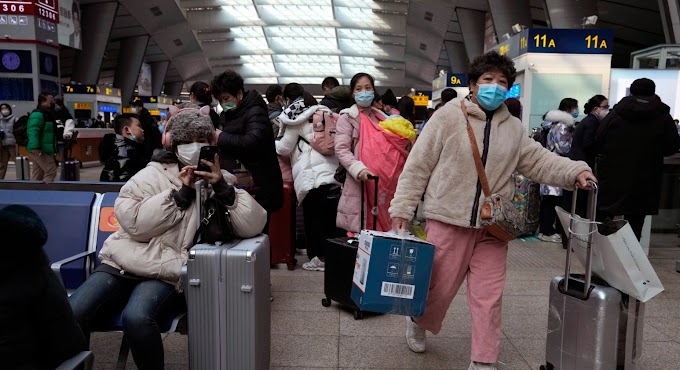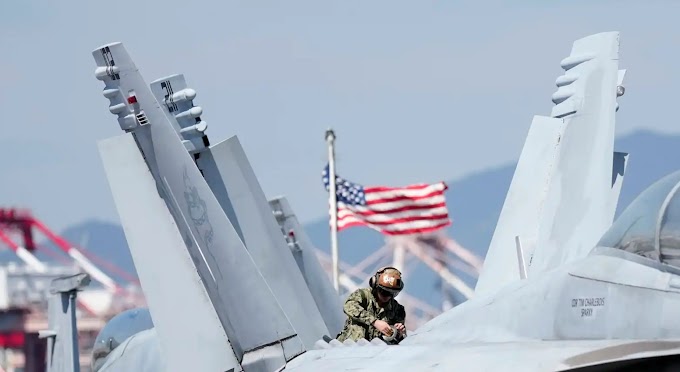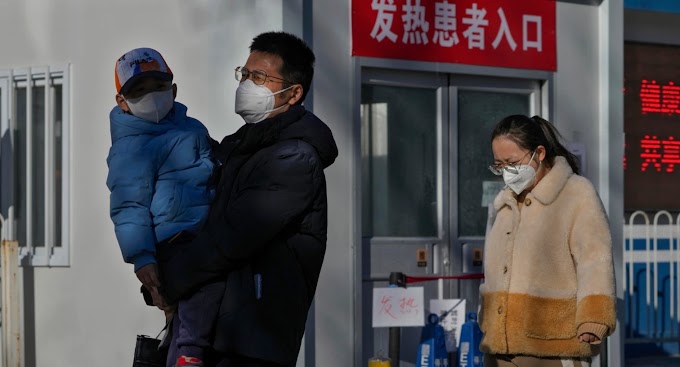U.S. official says U.S. not considering U.S.-South Korea nuclear drills
 |
| U.S. soldiers inspect F/A-18 Super Hornet fighter jets on the deck of the nuclear-powered aircraft carrier USS Ronald Reagan arriving at the port of Busan, South Korea, Sept. 23, 2022. |
SEOUL-
The United States plans to hold tabletop military games with South Korea and expand other areas of defence cooperation but is not considering joint nuclear exercises with Seoul, a senior U.S. administration official said.
The U.S. announcement came after South Korean President Yoon Suk-yue said in an interview Monday that the U.S. and South Korea were in talks aimed at giving Seoul a greater role in the operation of U.S. nuclear forces.
Yoon told the conservative Chosun Ilbo newspaper that the discussions focused on joint planning and exercises of South Korean and U.S. nuclear forces — a process he envisions having the same effect as "shared nuclear weapons."
U.S. President Joe Biden said "no" when asked on Monday night if he was discussing joint nuclear exercises with South Korea. Biden was returning from a trip to the eastern U.S. state of Kentucky at the time, without elaborating.
On Tuesday, a senior U.S. administration official emailed VOA a statement seeking to clarify the situation, saying the U.S. and South Korea are "working together to enhance extended deterrence, including ultimately exploring our responses to a range of scenarios through tabletop games, Including North Korea's use of nuclear weapons."
North Korea (Democratic People's Republic of Korea) launched a record number of ballistic missiles last year and said on Sunday it was "doubling" its production of nuclear warheads.
The U.S. administration official also said North Korea's recent actions and statements had drawn "increasing concern."
Both the White House and South Korea's presidential office later denied that there was any contradiction in Biden's and Yin Xiyue's statements, and pointed out that because South Korea is not a nuclear-weapon state, technically speaking, it cannot participate in "joint nuclear exercises."
While this may be partly due to semantics, many analysts believe it reflects behind-the-scenes tension between the two allies over how best to engage South Korea in countering the North Korean threat.
Yoon, a conservative, has in the past pushed Washington and Seoul for a NATO-style arrangement that would have South Koreans train for the possible use of U.S. nuclear weapons in a conflict. At present, it seems that South Korea may only be satisfied with more cooperation in other fields.
After Biden and Yoon met in Cambodia in November, both leaders tasked their teams with developing a plan, a spokesman for the White House National Security Council said in a statement emailed to VOA. "Effectively coordinated responses to a range of scenarios, including North Korea's use of nuclear weapons."
"As the president said, we are not discussing joint nuclear exercises," the White House NSC official added.
South Korean presidential spokesman Kim Eun-hye defended Yoon's remarks in a statement to reporters. "South Korea and the U.S. are discussing information sharing related to U.S. nuclear assets, joint planning and subsequent joint implementation plans to counter the North Korean nuclear threat," she said.
The United States has not deployed nuclear weapons in South Korea since the early 1990s. At that time, the United States withdrew its tactical nuclear weapons from the Korean peninsula as part of a disarmament agreement with the Soviet Union. In its place is the U.S. "nuclear umbrella" that protects South Korea -- an ally that Washington has vowed to use all its capabilities, including nuclear weapons, to defend.
In an interview on Monday, Yin Xiyue said such thinking was outdated. "What we call 'extended deterrence' means the U.S. will take care of everything, so South Korea doesn't have to worry," he said.
"But now, it's hard to convince our people with this idea alone," Yin Xiyue said.
When running for president of South Korea in 2021, Yoon Suk-yue said he would ask the United States to redeploy tactical nuclear weapons or agree to nuclear sharing. The State Department quickly vetoed the proposal.
Many analysts are skeptical that the U.S. would make such an arrangement, noting that it would run counter to the administration's stated global non-proliferation goals and support for the complete denuclearization of the Korean peninsula.
"South Korea's concerns and wishes are understandable, but the U.S. will not be able to discuss the nuclear program together to the extent that Seoul wants. This is still too difficult to achieve." Kim Do-yeon, an expert on Korean Peninsula issues at the Center for a New American Security in Seoul Say.
If South Korea participates in the tabletop game, it could learn more about how the U.S. weighs options in various crisis situations, she said.
"Since (U.S.-South Korea) joint nuclear planning is not going to happen and Seoul wants to have a say, a South Korean leader like the president can unilaterally tell the U.S. president that he/she is expected to be involved in the nuclear (military) program," said Kim Do-yeon. Consider which North Korean targets, but cannot expect a response."
She added: "It is conceivable that South Korean fighter jets could one day practice escorting U.S. bombers as a way for NATO to engage in 'nuclear sharing', but it is hard to imagine the U.S. doing more than that."
Ankit Panda, a nuclear policy expert at the Carnegie Endowment for International Peace in Washington, also doubts that the United States would be willing to include South Korea in its nuclear program.
"Ultimately, the decision on whether nuclear weapons should be introduced into a particular crisis contingency will rest with the President of the United States," Panda told VOA.
The issue has become even more urgent as North Korea has become more belligerent and expanded its nuclear arsenal.
North Korea is thought to have enough fissile material to make about 50 nuclear bombs and has a growing collection of short- and long-range weapons capable of delivering nuclear bombs. Some South Koreans worry that Washington may be reluctant to respond to a North Korean attack on South Korea if North Korea can destroy a major U.S. city.
Many South Koreans are also uncomfortable with former U.S. President Donald Trump, who frequently questioned the value of the U.S.-South Korea alliance and even threatened to withdraw troops from South Korea.
As a result, more and more prominent South Korean figures are calling for South Korea to acquire its own nuclear deterrent.
Sixty-seven percent of South Koreans, including 70 percent of conservatives and 54 percent of liberals, support South Korea acquiring nuclear weapons, according to a poll released Monday by Seoul-based Hankook Research.







